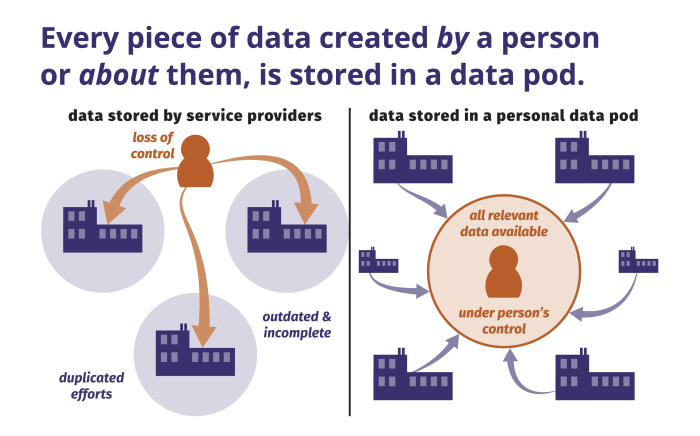Solid protocol in football: a decentralized data storage system for implementing data backpacks
28/11/2023
Share this post

In the previous article Power to the player: empowering football players through data rights and data backpacks we discuss the data-driven era in football and the lack of player control over personal data. The article introduces a 'data backpack' system using the Solid protocol, allowing players control over their data for performance enhancement and ethical use. Read further for the second part of this blog series or go back to the previous article.
Solid is a protocol that consists of a set of open technical specifications currently being worked on within the W3C, an organisation that produces and maintains standards for the World Wide Web. Solid focusses on decoupling previously centralised data (shielded in data silos), applications and identities (e.g., Facebook single-sign-on login) on the World Wide Web and standardising interactions between these elements through interoperability. Think technically about shared ontologies, vocabularies, or schemas to map data into.
Central to this Solid protocol is the implementation of a decentralised storage system for personal data, called a "Pod" or "Personal Data Store". In doing so, data should ideally be stored according to the "once-only" principle, creating effective reuse, and not leaving countless copies in different data silos of applications or sports clubs. In certain exceptional cases, such as a report of a medical operation, a certified copy of the report could be stored in the Pod. By decoupling the services of applications from their central storage locations, these decentralised storage locations or Pods give individuals more access control over their personal data.
By employing Solid Pods, football players can ensure their data's security and privacy, while maintaining ease of access for authorized parties. Solid Pods therefore potentially provide an optimal platform for implementing the data backpack concept. While players historically have often not taken their data from one club to another club or even to their national association (because there was no convenient mechanism to do so), Solid Pods provide a real portability solution. This will allow players in the future to use companies’ services outside the club, or interact in a different way with companies with which the national association collaborates.
A specialist centre for knee injuries, for example, could then among others gain access to the history of injuries as stored in the Solid Pod. If players are not satisfied with the service of one of the companies, they simply give another company access and ideally stop the data flow to the previous company. This can create a new ecosystem in which the collection and management of data is no longer central or is no longer a condition for further service provision. After all, the emphasis is now on providing services of added value on top of the data allowing companies to specialise in, for example, injury prevention for a whole section of players, regardless of their club.
The current context of data silos will not simply transform into an ecosystem of Solid Pods. Rather, it will be an incremental improvement, evolving first from opening silos to creating specific ecosystems of Solid Pods. This will require certain bodies that will facilitate the rollout of the technology. In Flanders, Athumi, the data utility company, will start rolling out Solid Pods based on the Solid protocol in the near future. User environments such as the Flemish 'My Citizen Profile' can then offer a user interface to navigate within one or more Solid Pods. A use case has also already been rolled out in the UK in collaboration with the BBC to improve streaming recommendations of users by combining (importing) data from Spotify and Netflix in Solid Pods.
Companies in Flanders are also starting to experiment with Solid technology. However, a broader rollout or a rollout at the initiative of certain authorities will be necessary to put the Solid Pod system into effect. While the EU is fully committed to interoperability and shared ontologies, vocabularies and schemas in the field of its Data Spaces (for now mainly in the field of public services), national associations specifically focused on sports, such as the RBFA, could, in cooperation with Athumi, take the initiative to roll out Solid Pods on a larger scale in the future.
Technical Aspects and Challenges of Solid Pods:
When evaluating Solid Pods against traditional athlete management systems (AMS), we observe several key distinctions:
- Data Security: Solid Pods decentralize data storage, which could enhance security by dispersing risk and reducing the likelihood of extensive data breaches. This is particularly pertinent for protecting sensitive athlete health and performance data.
- Access control and empowerment for Athletes: With the Solid framework, athletes maintain access control over their data, housed in personal Pods. This contrasts with traditional AMS where organizations oversee the data in a non-transparent manner to the athletes, which could raise issues around autonomy and exploitation of athletes’ personal data. Solid's architecture also allows athletes to selectively share data for scientific research themselves. This promotes a collaborative environment for advancing sports science research within GDPR guidelines.
- Regulatory Compliance: Solid Pods inherently align with GDPR mandates, offering a streamlined method for managing consent and data access, critical for ethical sports research. Traditional AMS may require complex adaptations to their centralized frameworks to achieve similar compliance.

Solid Pods operate on a decentralized architecture, providing more resilience against potential data breaches and single points of failure. This architecture entails distributing data across multiple nodes or servers, enhancing security, and preventing centralized data control. Solid Pods utilize Linked Data principles and standardized data models, ontologies, vocabularies, or schemas, which simplify data integration, interoperability, and sharing among different applications.
However, implementing Solid Pods in the context of data backpacks presents several technical challenges that need to be addressed:
- Scalability: As the number of players adopting data backpacks grows, the Solid Pods infrastructure must efficiently accommodate the increased data volume and access requests, ensuring consistent performance. In that respect, it has already been suggested to think of a Pod as a hybrid, contextualised knowledge graph rather than a document-centric model (like classical repositories). Similarly, future research focuses on the use of aggregators, a network of query and reasoning agents that each contribute (partial) results to a query by providing an up-to-date, i.e. continuously maintained, view of the underlying decentralised data.
- Interoperability: Ensuring seamless data exchange and integration between various sports clubs, coaching staff, sports scientists, and medical teams requires the development and adoption of common data standards and formats across the football ecosystem. The current, non-standardised use of coding techniques (data models, vocabularies and ontologies) describing data can throw a spanner in the works in this regard. Moreover, describing data through coding techniques so that the meaning of data is always understood by computer systems, regardless of the context in which it is used, can be criticised from the point of view that different linguistic, cultural, legal and administrative environments further complicate the achievement of this objective.
- Data Security and Privacy-preserving processing: Ensuring the players' data remains secure and confidential demands robust encryption and authentication mechanisms, protecting against unauthorized access, data breaches, and potential misuse. Although research has already been done on the use of Secure Multi-Party Computation (MPC) in processing data from Solid Pods, this does not solve the problem of untrustworthy agents participating in the MPC. Although the current Solid Protocol for identification relies on a so-called WebID, via the WebID-OIDC standards and associated Web Access Control protocols, additional research is also needed on the collection of identifiers or identifying data in such a process.
- User-Friendly Interface: To encourage widespread adoption, the Solid Pods platform must offer an intuitive and user-friendly interface, enabling players and stakeholders to easily manage and access the stored data. Further research could focus on the underlying reasons for the positive influence of certain factors on the adoption of WebIDs, for example. Further development of Pod browsers also plays a crucial role in this regard.
Conclusion
The 'power to the player' principle, focusing on data rights and a so-called data backpack implementation, holds the potential to revolutionize the football and sports industry. Empowering players to control their data can foster a more equitable and transparent environment for players to navigate throughout their careers. Solid Pods provide a promising solution for implementing this system, allowing players to securely store and manage access to their personal data. By embracing the data backpack concept, we can progress towards a future where football players have the autonomy to make more informed decisions about their careers and genuinely own their success.
Moreover, Solid Pods' system and the access control players have with it also allows their data to be shared with other companies outside the club. Those companies can then perform additional analyses in terms of training or injury prevention, without having to hand over the players' data again. In that regard, national associations could also partner with certain companies to manage their players as ‘independents’ and provide independent advice, separate from the club, in the player's interest. In doing so, players can also choose to make their data available for research. After all, it is not only the method of storage that is central to Solid, but also the facilitation of an interoperable method of data sharing.
This blog is the second part of two. Thanks for reading.
Comments
There are no comments yet.


